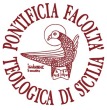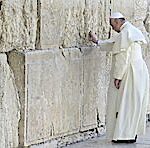Video Message of the Holy Father for the opening of the academic year 2024-2025 of the
Pontifical Theological Faculty of Sicily “Saint John the Evangelist” in Palermo, 16.10.2024
Video Message of the Holy Father
I am pleased to address you at the opening of your new academic year 2024-2025.
I am following in the footsteps of Saint John Paul II, who visited the Faculty of Sicily on 21 November 1982, on the occasion of his Pastoral Visit to Belice and Palermo.
Your Faculty, born with a strong ecclesiological vocation, is called from history and from listening to the breath of faith that the People of God possess, to take the lead in facing the challenges that the Mediterranean region poses to theology: the ecumenical dialogue with the East; the interreligious dialogue with Islam and Judaism; the defence of human dignity in the Mediterranean, often made a monstrosity by the logic of death; the cultural and social force of popular religiosity – “popular piety”, as St Paul VI put it; the resource of literature for the recovery of the cultural dignity of the people; and, above all, the challenges of liberation that come from the cry of the victims of the Mafia. Paul VI; the resource of literature for the salvation of the cultural dignity of the people; and, above all, the challenges of liberation that come from the cry of the victims of the Mafia.
It is a matter of learning the craft of theology as the weaving of evangelical networks of salvation, just along the Sicilian shores of the Mediterranean.
It is a patient work that tries to narrate the Master’s love, capable of arousing the amazement of encounter and friendship. Astonishment, which is precisely the nerve that awakens faith.
Imagine, then, the moment when the Master paused on the shores of the Sea of Galilee to contemplate the fishermen arranging their nets (Mt 4:18-22): what made him call them to him, to gird himself with their humanity, to send them out as fishers of men?
And why, in Jesus’ mind, in his way of thinking, do nets become a sign and instrument of salvation?
This is the task of Mediterranean theology: to weave nets of salvation, evangelical nets faithful to Jesus’ way of thinking and loving, woven with the threads of grace and interwoven with God’s mercy, with which the Church, even in the Mediterranean, can continue to be a sign and instrument of salvation for humanity (cf. Lumen gentium, 2).
And in this way theology can love, can become charity.
This is a true analogy of the cross: “From the height of the Cross, the theologian is challenged to look at human reality with the eyes of the One who humiliated himself to become the least of all, renouncing his divine prerogatives and taking on the condition of a servant”. [1]
I like to think, then, of a leap of proximity that completes the leap of faith, so as not to be a balcony of history, but a weaver of nets who knows how to weave around himself the humanity of Christ and his Gospel.
Brothers and sisters, nets are woven and rewoven sitting on the ground, often on one’s knees.
Let us not forget that this is the best position to love the Lord: on our knees.
It means adopting the style of the washing of the feet and that of the Good Samaritan who bends over the wounds of the unfortunate man at the hands of robbers.
Let us imagine the hands of theologians as hands that tell of God’s embrace, hands that offer tenderness – don’t forget that word, tenderness, which is God’s style – hands that lift up those who have fallen and give them hope.
And let us not forget that only once is it permissible to look down on a person: only to help him to lift himself up.
In this way, theology requires and includes witness, even to the point of giving up one’s life, the gift of self through martyrdom.
This country has great witnesses and martyrs, from Father Pino Puglisi to Judge Rosario Livatino, not forgetting the magistrates Paolo Borsellino and Giovanni Falcone, and so many other public servants.
They are true “chairs” of justice, inviting theology to contribute, with the words of the Gospel, to the cultural redemption of a territory still tragically marked by the scourge of the Mafia. Let us not forget this.
Doing theology in the Mediterranean, then, means remembering that the proclamation of the Gospel passes through a commitment to the promotion of justice, the overcoming of inequalities and the defense of innocent victims, so that the Gospel of life may always shine and evil is rejected in all its forms.
There is a need for a theology of “compromise”, which immerses itself in history and makes Christ’s charity shine in it. In this regard, I would like the faculty to undertake processes of theological and social research on forgiveness, at the crossroads of legality, resistance and holiness.
Begin with creativity a genuine theological and social laboratory of forgiveness, for a true revolution of justice!
And this, I like to say, is the vocation of your island.
However, it is also the place where cultures, histories, and different faces meet in harmony, and commit theology to fostering dialogue with the sister Churches of the East that also overlook the Mediterranean.
The route of ecumenical and interreligious dialogue, difficult though it may be, is that of re-proposing and supporting, through experiences of encounter, experiences also of exchange and collaboration, listening jointly to the Holy Spirit.
It is the legacy of many martyrs of dialogue in the Mediterranean.
Therefore, you are entrusted with the mission of establishing yourselves as a laboratory of a theology of ecumenical dialogue and a theology of religions, leading to a theology of interreligious dialogue.
Always the word dialogue, dialogue, openness.
Finally, in this context, the exchange between theology and literature seems fruitful;
It is a note that has characterized the research of your Theological Faculty in recent years, especially in the choice to acknowledge that intuition of faith which belongs to the experience of the people.
Literature often recounts this and makes it possible to read the Sicilian and Mediterranean reality,
It helps you all to rediscover your identity in dialogue and enables you to take off your sandals “before the holy ground of the other (cf. Ex 3:5)”. (Evangelii gaudium, 169).
On the other hand, how could one understand the multifaceted Sicilian thought without Pirandello, Verga, Sciascia, and without the existential themes on which they wrote unforgettable pages?
Dear brothers and sisters, the Mediterranean needs a living theology, a theology that cultivates to the full its contextual dimension and becomes an appeal to all.
Cultivate this theology that compromises with history, just as God in the flesh of the Son compromised with our tears and hopes.
Cultivate a theology that, from the heights of the cross and on one’s knees before one’s neighbour, uses humble, sober and radical words to help everyone arrive at compassion; words that teach us to build networks of salvation and love, to create a new history rooted in the history of the people.
I embrace you and ask you to pray for me. I thank you.
[1] M. Naro, Protagonista è l’abbraccio. La piccola teologia di Francesco.
Protagonist is the embrace. Francis’ little theology book.


